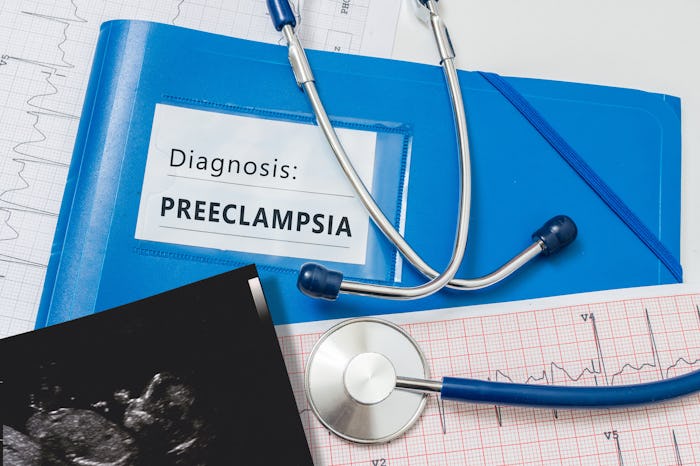Life

How To Prevent Preeclampsia — 5 Ways To Keep Your Chances Low
I was a model patient when pregnant with my daughter. I never had any complications, I maintained a relatively low weight gain, and I felt great. Until I hit about 36 weeks. All of a sudden, I was swollen from head to toe, I gained 50 lbs, and my blood pressure skyrocketed. After finding the protein spilling into my urine, I was diagnosed with preeclampsia. I was totally shocked and tried to figure out if I could have learned how to prevent preeclampsia.
I wasn't alone though. According to the American Pregnancy Association, preeclampsia affects at least 5 to 8 percent of pregnancies. It can be dangerous during pregnancy, especially if left undiagnosed, and the only cure for preeclampsia is delivery. The Preeclampsia Foundation notes that most women deliver a healthy baby and recover fully, but it's still not necessarily something you want to deal with during your pregnancy. Because preeclampsia affects the arteries carrying blood to the placenta, your baby may receive less oxygen and have a lower birth weight, according to the Mayo Clinic. In fact, preeclampsia is to blame for up to 20 percent of the 13 million preterm births each year. Those diagnosed with preeclampsia are also at an increased risk for placental abruption, HELLP syndrome, eclampsia (which is preeclampsia, but accompanied with seizures), and cardiovascular disease.
So was there anything I could have done to prevent being diagnosed with preeclampsia? The American Pregnancy Association notes that currently, there is no sure way to prevent preeclampsia. There are too many contributing factors to high blood pressure and while eliminating some seems to help, not all of them can be controlled. But there are a few things doctors and researchers recommend to try and lower your risk of being diagnosed with preeclampsia. While nothing is guaranteed, you can follow these five guidelines if you want to keep your chances as low as possible.
1Use Little Or No Salt
The American Pregnancy Association recommends lowering your salt intake while pregnant. Eating salt can raise the amount of sodium in your blood stream and reduce your kidney's ability to remove the water, leading to high blood pressure from the extra fluid and strain on your blood vessels.
2Take A Vitamin D Supplement
New research has recently found that inadequate levels of vitamin D may be associated with a higher risk of preeclampsia. In fact, Parents reports that a few studies determined that the risk of preeclampsia is five times greater in women with low levels of vitamin D. However, be sure to speak with your doctor about your concerns before supplementing with vitamin D.
3Stay Hydrated
The American Pregnancy Association recommends drinking six to eight glasses of water per day and avoiding caffeinated beverages in an effort to stay hydrated. Indulging in lots of fluids and non-caffeinated drinks can keep any swelling down and help your blood pressure.
4Take A Calcium Supplement
The World Health Organization notes that pregnant women with a low dietary calcium intake can take calcium supplements in an effort to lower their risk of preeclampsia, especially if they are already at a high risk of developing the disease. Again, be sure to speak with your doctor before taking any supplements.
5Follow A Healthy Routine
In general, making healthy choices is good for you, no matter what, but especially during pregnancy. The American Pregnancy Association recommends exercising, getting enough rest, elevating your feet throughout the day, and avoiding a lot of fried or junk foods to keep your body healthy and lower your risk of preeclampsia.
This article was originally published on